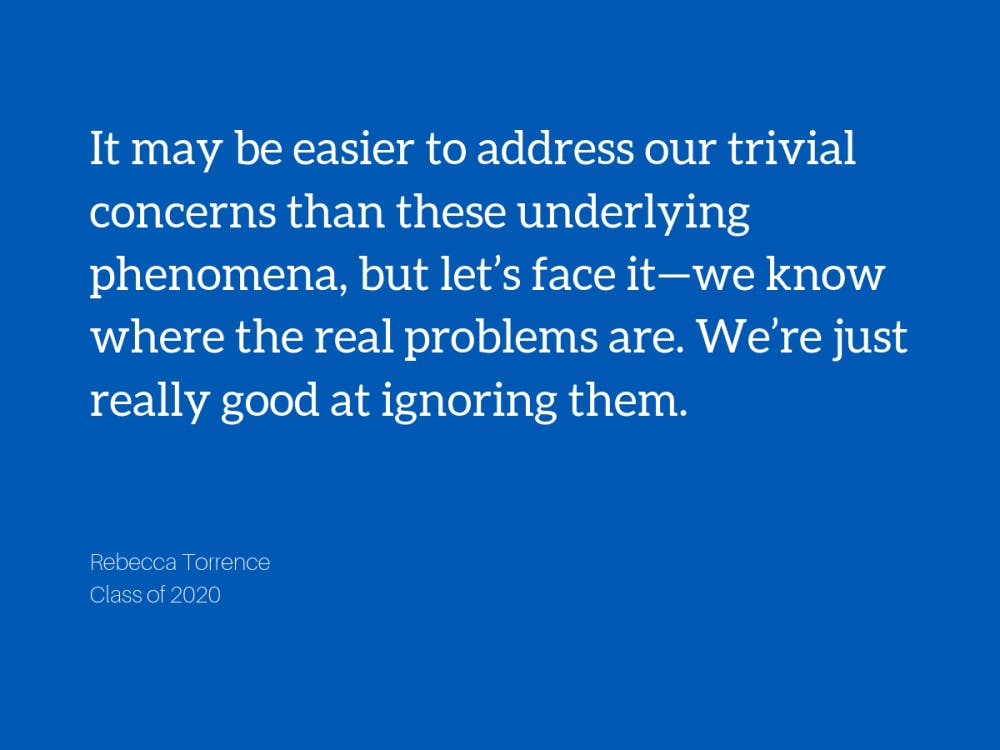We’ve become accustomed to a number of luxuries at Duke. Some of us have been afforded such privilege our entire lives; for others, these indulgences are unique to this campus. But regardless of our backgrounds, we are all getting a top-notch education, going to class in beautiful buildings, and choosing from literally dozens of delicious on-campus restaurants.
We’ve gotten used to that.
I’ll be the first to admit that I often forget how lucky I am. And it’s easy to see why—most of the time, we run around this school like chickens with our heads cut off, bouncing from classes to extracurriculars to late nights in Perkins. We don’t give ourselves time to reflect.
But there’s a difference between never stopping to smell the roses and blatant ungratefulness. Last Wednesday, senior Sami Kirkpatrick wrote an column entitled “Don’t eat the West Union fish.” Apparently, Sami had unpleasant experiences at both JB’s Chop House and Ginger and Soy, and thus saw fit to denounce the consumption of all fish throughout the dining hall. He concluded that these experiences demonstrate Duke’s focus on aesthetics over quality, which, in the case of West Union, gives vendors “the confidence to attempt dishes they have no business attempting.”
I have no interest in starting a feud with Sami. But there are several facets of his column that stand out to me as examples of the disconcerting privilege we witness at Duke every day. It’s about time we take a closer look at the implications of such Duke-specific complaints.
For every amenity at Duke, there are people behind the scenes, both those who worked to bring us each perk and those who keep it up and running. West Union didn’t appear out of nowhere according to your every specific preference—it had to be planned, funded and built, and vendors had to be selected, contracted and prepared to operate the restaurants daily for hundreds of customers. There were real humans involved in every stage of that process.
When you issue blanket criticisms about West Union’s food, you are by proxy criticizing all of the individuals who work tirelessly, and for modest income, to feed you things you’ll enjoy. People in the service industry deserve nothing less than our pure gratitude and kindness.
And towards the idea that West Union’s architecture gives these restaurants undue confidence—why complain about the fact that West Union’s vendors want to create dishes that mirror the grandeur of the building? Is it not evidence of a restaurant’s desire for quality to add a fancier dish to the menu? It’s not like they’re making foods that they “have no business attempting” for their own pleasure. Plus, the fact that JB’s served “blackened salmon tip pineapple goulash” at all should tip you off to the fact that you have far better dining options than the average college student. If it’s still not good enough for you, I’m more than happy to take it off your hands.
Sami’s article is in no way the first instance I’ve heard such criticisms. Duke students love to build comradery by ragging on the bus schedule, the cleanliness of the bathroom on their hall or the fact that it takes them 10 minutes to get from their dorm to class compared to their friend’s five. I get it—complaining about minor inconveniences can be reflexive, even cathartic at times. But while it may be an easy conversation topic, constant complaining can contribute to your risk for anxiety and depression. On the other end, rewiring your brain for gratitude can decrease that risk. Plus, you improve the lives of those around you—particularly the employees you’d otherwise criticize—by reducing negativity in the air.
Even though I hear complaints like Sami’s all the time, I remain routinely fascinated by the hills Duke students choose to die on. Racism on campus? The prevalence of sexual assault? Our declining mental states? Not interested. No, the issue that really needs addressing is that Red Mango just doesn’t hit the spot quite like Quenchers.
It may be easier to address our trivial concerns than these underlying phenomena, but let’s face it—we know where the real problems are. We’re just really good at ignoring them. But recognizing this tendency isn’t enough—we should redirect our energy towards genuinely productive dialogues. I understand the importance of holding Duke accountable even for the minor details, but I’d argue that we have a greater responsibility to hold Duke accountable for its stated commitment to protect the rights and identities of all students. Where are you when those issues come to the table?
Eat the damn salmon and figure it out.
Rebecca Torrence is a Trinity junior. Her column runs on alternate Thursdays.
Get The Chronicle straight to your inbox
Signup for our weekly newsletter. Cancel at any time.

